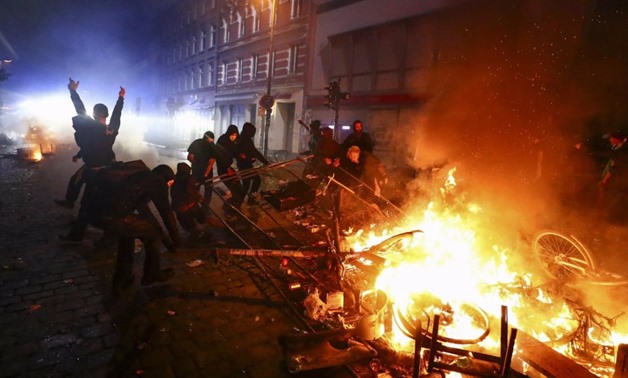
Berlin hopes crackdown will avert repeat of demonstrations against G20- Reuters
CAIRO – 28 August 2017: Blocking websites are deemed protective measures when it comes to national security by European countries, but when the same protective measures are taken by Egypt, Cairo is accused of ‘violating human rights’ that may be fined as well by cutting aid.
When Egypt decided to block 21 websites last May because they publish content that “supports terrorism and deliberately spreads lies about the Egyptian state,” European leaders slammed the Egyptian decision and accused Egypt of violating human rights’ laws and abuse of democracy.
In June, Egypt’s President Abdel-Fattah al-Sisi received German Chancellor Angela Merkel and stressed on the need for intensifying international resolve in the face of countries that fund and support terrorism.
Sisi also told Merkel that a strong message should be directed toward these countries if the international community wants to completely eradicate terrorism, according to Egypt’s state news agency MENA.
On the other hand, many European countries including Germany, the UK and France have taken regulations deemed violations to the Human Rights’ Charter adopted by the United Nations and the European Union.
There are so many examples of European violations of the human rights acts that are approved by their regimes. Egypt is always in the spotlight when it takes legitimate measures to defend national security and public order.
Egypt is not criticizing the German protective measures taken recently such as blocking websites on charges of spreading lies and inciting violence. Instead, it hopes German leadership and other European leaders follow the same protocol as Egypt in not interfering in other countries’ domestic affairs when “it comes to matters of national security,” Egyptian experts said on Friday.
Germany's Interior Ministry has banned on Friday an Internet site on allegations it was used to ferment left-wing extremist violence, including at this summer's G20 summit, following the blocking of a right-wing website which published content that promoted hatred against Jews and Muslims and the LGBT community earlier this year.
According to the German Interior Minister Thomas de Maizier, the far-left website was responsible for mobilizing violent actions and attacks on infrastructure targets and provided information on how to make gasoline bombs.
“The truth is, the interpretation of human rights legislation has exerted a chilling effect on public-sector organizations, leading them to act in ways that fly in the face of common sense, offend our sense of right and wrong, and undermine responsibility,” former British Prime Minister David Cameron said on August 15, 2011.
In 2013, following spread of so-called ‘lone wolf’ phenomenon and individual terrorist attacks carried out by groups affiliated to the Islamic State (IS), Cameron announced plans to rewrite European human rights rules, denouncing current laws.
Cameron has made it clear in September 2013 that he is ready to pull the UK out of the European convention on human rights if he believes it is necessary to keep Britain safe.
The EU decided to monitor websites to counter terrorism and detect websites that promote systematic violence, and it admitted after the Paris attacks that it is necessary to protect the borders of the EU with further control over the Internet, and some websites used to recruit European youth to fight in Syria have been blocked, the report said.
In March 2015, France removed certain websites from the results of search engines without judicial supervision, including content abusive to children and websites that incite terrorism or condone it, the report added.
It also said the UK has operated an espionage program that has cost millions of dollars from 2009 and stores online activities of users.
American and Asian regimes contradict themselves. They criticize Egypt for what they themselves have been doing; most importantly blocking websites that spread lies and affect national security.
Iran blocked Facebook and Twitter in 2009 following protests during the presidential elections and it blocked Instagram in 2013.
In 2012, Pakistan blocked YouTube because it refused to remove an anti-Islam video, and Twitter has been blocked for similar reasons several times, but both Twitter and Facebook have accepted demands by the Pakistani government.
Vietnam has unblocked Facebook but banned sharing anti-government stories or private information, while Eritrea blocks YouTube and closely monitors the internet.

Comments
Leave a Comment